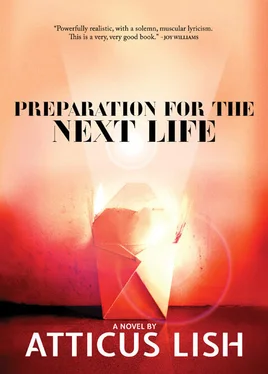Skinner took another drink from his bottle. The audio was bad because there was sand in his laptop. His hearing was sixty percent in his strong-side ear, the side he held his weapon on. Battlefield dirt got in your body through the lungs and through wounds.
He watched IEDs detonating, the explosion blotting out the vehicle, the men, the road, then the brown cloud rolling down and spreading out, and you could see the vehicle at an angle. He watched guys who got hit by a sniper, getting punched down. He watched a wounded fighter lying in the dirt. The ground was smeared with a wide red swath of blood. The fighter lifted his AK-47 and the good guys shot him. The sparks went through his body at angles: through his shoulder, chest. Now he lay unmoving. He watched his guys shooting from a rooftop, ten minutes of jumping footage showing three or four guys, the M60 shaking in bursts, the guys talking, pointing over there, the M60 being turned, the casings falling out like dry feces, set to death metal.
He listened to cock rock, thrash metal, big rock ballads, country and western — the numbers they used to play in battle. He turned the decibels all the way up, and it still felt as if he couldn’t hear it. And it wasn’t because he was deaf, it was because nothing sounded like anything after battle.
In his mind, he knew that she was special. He could picture her lying on his bed with the poncholiner winding between her legs and across her bare hip like a green snake and her phoenix eyes on him, a combat fantasy. She was what he had ached for when he had been over there. When he had believed he was going to die, the idea of never having a woman to love him had summed up all his pain. Now, as he sat there with the flask empty on the linoleum at his feet, he checked himself and found his ache was missing. The world was dull or annoying to him, and she was just like any other female, he felt: she had certain functions. And he had seen those functions turned inside out by high explosives, he knew what was inside people, and there was nothing there. It was gross. It was boring. It was sickening and that was all.
The loss of this feeling horrified him. It was yet another thing that didn’t work on him.
When I was younger, I always wanted to be in love with somebody someday. The thought that that was over, that I couldn’t feel that anymore, this really hit me hard. It took my hope away.
She set up the steam table, dialed up the flame, mopped the kitchen, threw the breaker for the counter lights. The other women came and the noise began and she went back to the hallway behind the kitchen and dumped her tub of slop from yesterday into the garbage.
In midmorning, she checked her phone. No message. She shoved her cart down the hallway, accelerating past doorways that gave onto the insides of the kitchens, the cutaway inner works of the counter, the rodent dead beneath the steam table, the mass of customers on the other side, then the wall again. A skinny old man in a white apron splotched with yellow grease leaned out into the tunnel and dropped an armful of empty boxes in her way and she almost ran him over.
She blasted her trays with the sprayer before jamming them in the conveyor belt, which went into the dishwasher, a two-foot-square stainless aluminum box connected by a tube to a wall-mounted soap bladder. She threw the lever and let it run.
On the floor she stood over kids with North Face parkas and perm-up hair and sunglasses who were playing with their food, and waited for their trays. A Hong Kong boy was talking about banana boat people and laughing huhuhu.
You gotta let people eat, he told her.
Incorrect, she said and took his tray.
He followed along behind a young man in a Frontrunners jacket and baggy jeans with his drawers showing, who took him around the corner and said, Lemme see twenty. What you got? They traded what they were respectively holding, hand to hand. Then he went into the newsstand on Roosevelt and bought a pack of Dutch Masters. Dismissively, with an air of infinite superiority and languor, the Pakistani put his change on the counter, as if he were untouchable. Skinner raked the dimes and pennies into his hand and left without a word.
Under the expressway, he made a little staging area to get his baggy out and split one of the cigars open. He brushed the tobacco away, and blew it away, and the grains fell on the cardboard of a campsite, the used-up aerosol cans rusting in multicolored plastic bags.
Then Skinner climbed the ramp and smoked his blunt alone in the middle of everything, hiking back and forth over the overpass above the expressway. In the middle of the arch, he stuck his fingers through the fence and held himself. The traffic poured by underneath him. If you looked one way, among those fire escapes, Zou Lei was over there. Three klicks to the east, that was where he lived. Looking this way, past Manhattan in the smoky distance, if you went far enough, was his unit in the barracks, the guys in Warrior Transition, in the group rooms where their wheelchairs were placed in formation and they did modified PT.
And behind him — he turned to face the other way — out there, if you kept going and going, eventually, was the war.
Imagine if this was Iraq right now, he thought. You’d be lighting up all these cars. He gazed at the sliding chains of traffic. These people have no idea. He took a hit, squatting now, holding in the smoke. I’m high as fuck. If I was there, if this was the Box, I’d have a buddy to pass this to.
In his narcotic state, he saw the sand going on and on across the continent. The broken palm trees and mud buildings and corrugated steel lean-tos and dead trucks and the domes and spires of the mosques. He could hear the loudspeakers wired by a man who weighed twenty pounds less and looked twenty years older and who was the same age as he was, a goat herder with missing fingers. He heard the static and the ram’s horn and the voices as they spoke together, wearing robes the same color as the landscape, kneeling together, rising together, chanting together. He could see them as if he were watching them through binoculars and the Arabian dusk was coming down. He saw the dim blue sky and smelled the sunbaked human waste and saw the dark forms of his many friends, their gear, their white eyes and very occasional smiles. He tasted the smell of burning tires, hashish, gun oil, animals, coal fire, chicken and rice and Tabasco sauce. The weight of the gear. The tearing down of the body. All the things you complained about. And the thing that was greater — the war itself. It was the one thing. You went outside the wire, and each time, either you died or you did not.
He did sit-ups on the floor of his room, the dirt sticking to his back. He knew the grit was there from how it stuck to his scar tissue. He put his jeans on, his boots on, his hoodie and the camouflage. No laundry, no shopping. Sitting on the bus, then the train, not reading or thinking or even looking at anything. Just feeling the train rocking around the curve and going into the tunnel. The gray soot day smudged over everything, the tracks, the footprints all over the floor of the car. The decorative blue tiles said Hunter’s Point as the subway coasted by the platform underground. Like the antique tile-work that he had seen holes blown through, shards you crunched through, scraping and popping under their boots. Finding blood on the tiles. Building materials collapsed and torn open and out, the twisted rebar. When the walls were holed or sheared clean away, the cross-section looked like fish gills from the cavities in the cinder blocks. Sand in mounds that felt weird to step on because of something under it that slipped or rolled that wasn’t sand. The surface was oxidized black and when you kicked it up, the inside was yellow inside its cut edges like you had cut into an organ. Footprints left these yellow cuts in the sand. The smell of something foul came out. Shit or garbage or dead people with sand over it. He thought of that.
Читать дальше












